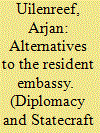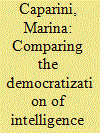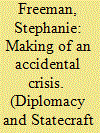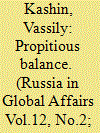| Srl | Item |
| 1 |
ID:
132417


|
|
|
|
|
| Publication |
2014.
|
| Summary/Abstract |
Increasingly integrated in a common political entity, the European Union's member states are exploring new avenues to shape and maintain their mutual relations. This analysis describes three alternatives to the traditional resident embassy by which ministries of foreign affairs within the EU attempt to maintain diplomatic networks. The models discussed are secondments within member states' capitals, visiting ambassadors, and co-location and co-operation. In other words, with regard to different modes of representation, member states can consider diving in, stepping back, or pooling and sharing. These developments shed light on the ways in which the diplomatic machineries of the member states are trying to adapt to the demands of a "post-Westphalian" environment such as that of the EU.
|
|
|
|
|
|
|
|
|
|
|
|
|
|
|
|
| 2 |
ID:
132889


|
|
|
|
|
| Publication |
2014.
|
| Summary/Abstract |
This article discusses the reform of intelligence governance in two sub-regional groupings of former communist states: East Central Europe and the Balkans. These two sub-regions are delineated according to the pace and nature of transformations that they have undergone since the collapse of communist rule and their relations with respect to the European Union, the key political and economic organization in Europe. A number of lessons are drawn from comparing experiences in the two sub-regions relating to democratic reform of the security apparatus, and in particular the intelligence sector. Significant factors in the consolidation of democratic governance of intelligence include the nature of precursor communist-era regimes and the legacies they created, whether armed conflict has occurred during the transition, the extent and character of external (especially EU) assistance, and the strength of media and civil society. These factors appear to have influenced how transitional regimes have sought to introduce institutional reforms to constrain the powers of those services and their susceptibility to arbitrary use. They also have influenced measures taken to redress abuses by intelligence services under the preceding communist regime and the legitimation of the post-authoritarian state.
|
|
|
|
|
|
|
|
|
|
|
|
|
|
|
|
| 3 |
ID:
132416


|
|
|
|
|
| Publication |
2014.
|
| Summary/Abstract |
This analysis re-examines the Carter Administration's formulation of policy on the theatre nuclear force issue following the neutron bomb affair. It demonstrates that European leaders did not foist the arms control component of the NATO dual-track decision on Jimmy Carter. Rather, the Carter Administration understood the merits of an arms control component following the August 1978 PRM-38 review and thought that Soviet-American arms control negotiations would play a crucial role in resolving the conflict between NATO and the Warsaw Pact over theatre nuclear forces. This analysis also considers the previously unexamined interactions between the United States and the Soviet Union in the months leading to the dual-track decision. It reveals that American officials underestimated the degree of Soviet anger over the dual-track decision, believing that arms control negotiations with the Soviets on theatre nuclear forces would be possible and productive. The Carter Administration did not foresee the Euromissiles crisis.
|
|
|
|
|
|
|
|
|
|
|
|
|
|
|
|
| 4 |
ID:
132708


|
|
|
|
|
| Publication |
2014.
|
| Summary/Abstract |
The Ukrainian crisis has demonstrated once again that the global Chinese business empire is growing much faster than Beijing's military-political capabilities. There has again emerged a need for a more active Chinese policy to protect national interests.
|
|
|
|
|
|
|
|
|
|
|
|
|
|
|
|